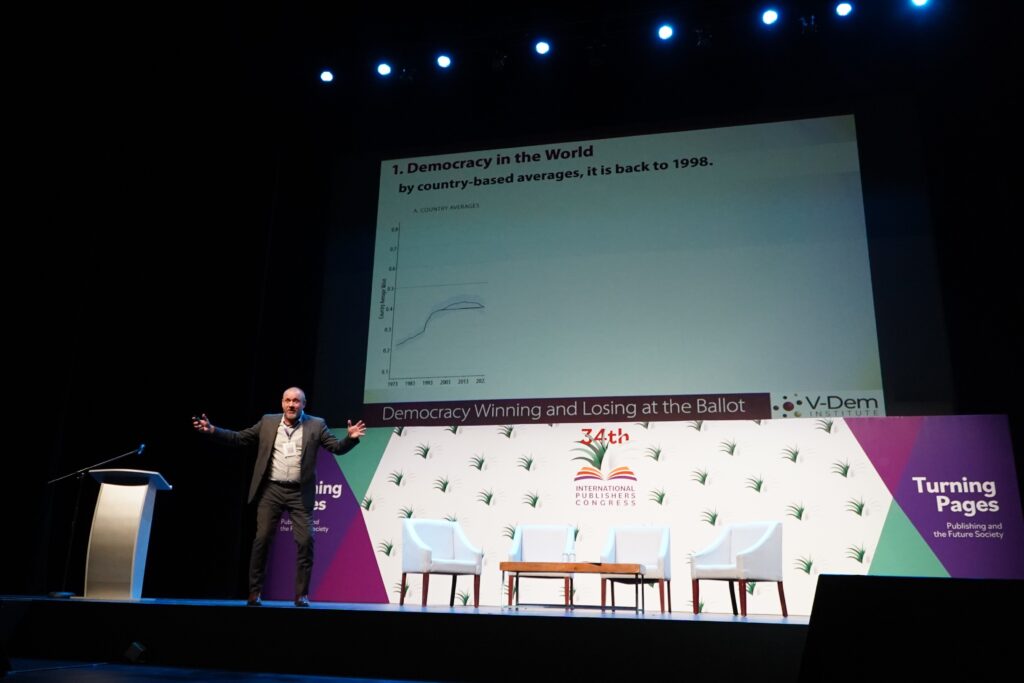Liberté, egalité, fraternité. It is France’s national theme, attributed to Maximilien de Robespierre, at the end of the French Revolution, when the French people sought to free themselves from the yoke of an oppressive monarchy.
This statement formed an entire system of beliefs that was also the foundation of the United Nations Universal Declaration of Human Rights, proclaimed in 1948.
According to the Universal Declaration of Human Rights, in its article 19, everyone has the right to freedom of opinion and expression. In a very simple inference, this also includes freedom of publication. Just as a person must be free to think and write, a publisher must be free to publish.
Due to recent unfortunate events, a third freedom has now been added: the right to read. This is why various international organizations, such as the International Authors Forum, PEN International, the IPA, the European and International Booksellers Federation and the International Federation of Library Associations and Institutions, have coined the expression “the trinity of freedoms.”
PEN International documents violations of freedom of expression in different countries every year, most recently in Georgia, where more than 90 media workers have been physically attacked, verbally abused or obstructed as police violently dispersed pro-EU demonstrations in the capital, Tbilisi.
One of the most concerning cases is Mexico, considered by various organizations as the most dangerous country in the world to be a journalist. Reporters Without Borders points out that Mexico is one of the most dangerous countries to practice journalism, with at least 37 journalists killed in the last six years. Just in the last couple of months, two more have been added to the list.
In relation to the freedom to publish, the International Publishers Association has done a commendable work for many years with the Prix Voltaire, which is awarded every year to persecuted or endangered publishers in different regions of the world.
When I had the privilege of presiding the IPA, I said that I wished that one day we would have to declare the Prix Voltaire devoid, because we would not have found any publisher at risk in the world. Unfortunately, this has not been the case. Every year we receive dozens of applications.
For 2024, the shortlisted publishers were from Russia, Serbia, Belarus, Türkiye and Palestine. The laureate was the publisher and bookseller Samir Mansour, from Palestine:
“2024 IPA Prix Voltaire laureate, the Samir Mansour Bookshop for Printing and Publishing has been a critical part of the local community in Gaza, publishing the works of Palestinian authors and housing thousands of books in various languages. Destroyed in 2021 and rebuilt through community efforts, the bookshop has once again been a victim of the Israel-Hamas conflict. The bookshop has continued its efforts to bring books to Palestinian youth, visiting evacuation centres and providing books and gift packages to displaced children.”
The IPA occasionally presents a posthumous prize for freedom to publish. In 2024 it went to the Ukrainian writer Victoria Amelina, who in 2023 had received the posthumous award on behalf of Volodymyr Vakulenko. Shortly after, Victoria Amelina herself would fall dead at the mercy of Russian missiles.
The Nobel Peace Prize winner Oleksandra Matviichuk received, in an emotional ceremony during the International Publishers Congress in Guadalajara, the posthumous award for her dear friend Victoria Amelina. The tragedy of a senseless war, as actually all wars are.
Finally, the issue of freedom to read. The very country that is considered the cradle of freedoms and whose most emblematic monument is a statue dedicated to liberty, today suffers from multiple attempts to ban a large number of books in libraries and schools. And all of this even before Donald Trump took office, making the outlook even bleaker.
PEN America reports more than 10,000 cases of book bans in the 23-24 school year in various states of America.
“Nearly 60% of these banned titles are written for a young audience and depict themes that young people face in the real world, including grief and death, experiences of substance abuse, suicide, depression, and mental health and sexual violence.”
The Association of American Publishers says the following on its web page:
“At AAP we believe that it is only by exposing, confronting, and addressing controversial speech, not by hiding it, that the merits of that speech can be tested. As a result, we promote the vigorous exchange of ideas and opinions through books and other publications.”
As the Supreme Court has explained, “[t]he right to think is the beginning of freedom, and speech must be protected from the government because speech is the beginning of thought.”
The mission of publishers around the world is to publish all these voices that are sought to be silenced by various spheres of power. In a world in which, according to the prestigious V-Dem Institute of Denmark, 75% of the world’s population lives in autocratic regimes, the work of publishers to publish all these brave voices that warn us of the risks of authoritarianism, is fundamental.

